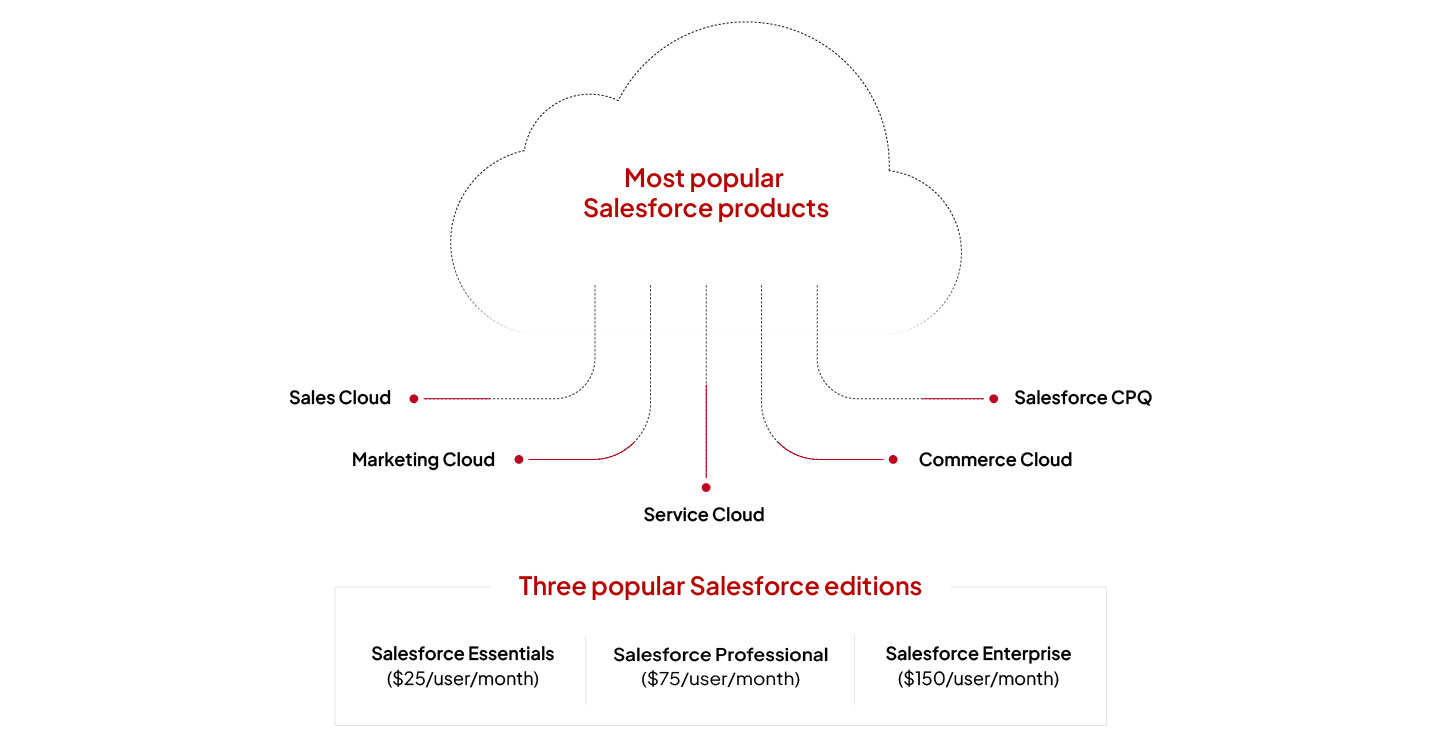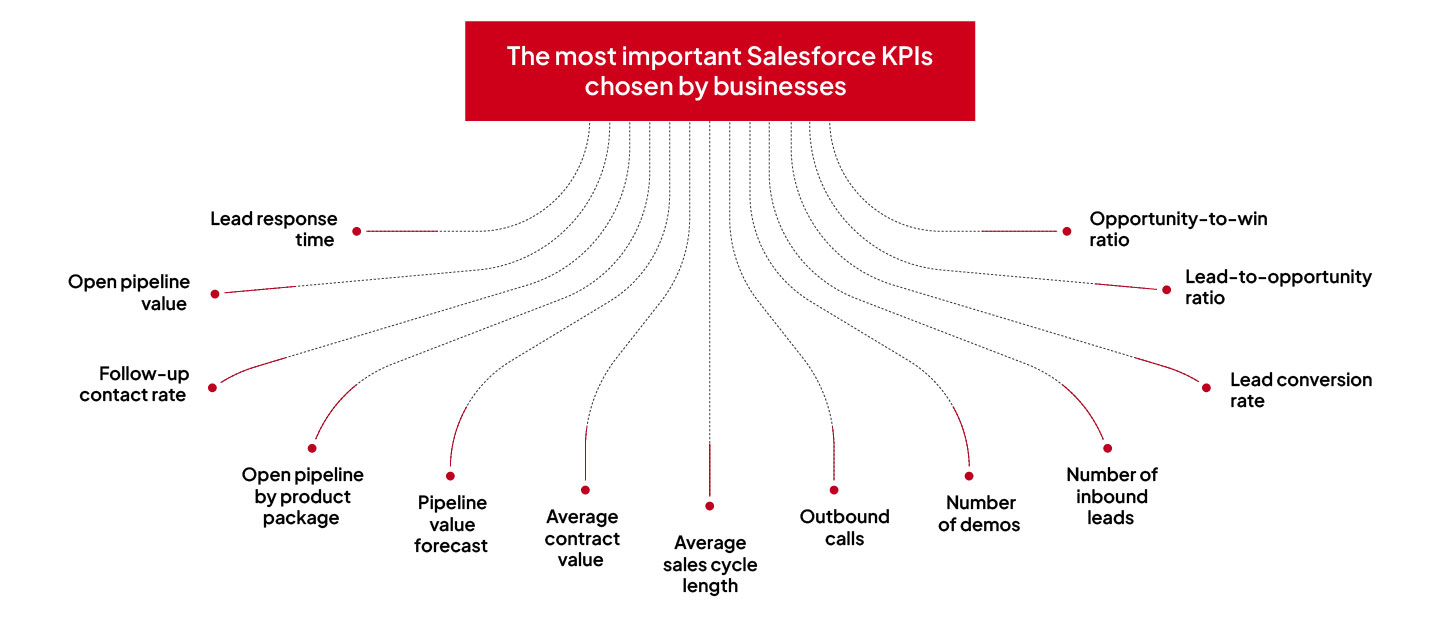Launched over two decades ago, Salesforce is still going strong in the CRM sector, keeping its services consistent. The CRM platform has kept its tools and features based on the ongoing trends in the industry. This has allowed companies to avail themselves of Salesforce implementation services even today.
However, Salesforce implementation is not simply limited to purchasing a suitable Salesforce license. Its scope is much bigger than that and involves processes like conducting thorough research, clearly defining business requirements, conducting tests, facilitating user adoption, and more.
A lot of Salesforce implementation revolves around tailoring the CRM platform based on the specific needs and preferences of your business. Implementation partners help you configure and customize the CRM platform according to the customers you are targeting, the businesses you want to streamline, and the objectives you want to attain through Salesforce implementation.
Being a vast and dynamic platform, it is important to get Salesforce implementation right. The business processes you perform and the results you obtain depend on the manner in which you implement Salesforce within your organization. Always make sure you take Salesforce implementation seriously to leverage your processes and enhance the productivity of your organization.
How to implement Salesforce within your organization?
Depending on the entities involved in the designing and development of your CRM solution, there are two major ways in which you can implement Salesforce within your organization – by yourself and with the help of an implementation partner.
1. Implementing Salesforce by Yourself
This is the homegrown approach to implementing the CRM platform within your organization. Here, you implement Salesforce with the help of your internal team of developers, architects, and administrators.
This is often a tempting route to take due to the admin-friendly back-end interface offered by Salesforce. However, it is not the best Salesforce implementation alternative as it restricts scalability. Implementing the CRM platform all by yourself is likely to make you spend more in the future for making necessary additions to the platform. This leads to the accumulation of technical debt for choosing the faster but less sustainable way of implementing Salesforce within your organization.
Moreover, your in-house IT professionals may not possess the skills and experience found in seasoned Salesforce implementation partners. This prevents you from optimizing Salesforce as per your needs.
2. Working with a Salesforce Implementation Partner
This is an ideal Salesforce implementation methodology as it is more scalable and holistic. Working with a recognized Salesforce implementation partner allows you to choose the right tools and implement the features that are best suited for your business. Salesforce partners often possess years of professional experience in the industry which makes them capable of offering quality services to your organization.
Best Salesforce Implementation practices
In the age of digitization, the relevance and prominence of a platform like Salesforce are more than it has ever been. Businesses belonging to all major industries and operating at all scales can implement Salesforce to leverage their processes and build healthy relationships with their customers.
Salesforce helps you manage your customer records and use them to tailor your services based on the needs of your prospects and customers. The CRM platform lets you track your relationships with your customers at all stages of their buying journeys.
Here are some of the best Salesforce implementation practices one should follow to thrive in the market:
1. Have clearly defined Business Goals
Your business goals form the base of your Salesforce implementation strategy. The tools you add, the features you use, the departments you implement CRM for, and the KPIs you set depend on the goals you want to achieve for your business.
Do you want to boost your sales? Do you want to spread awareness about your offerings? Do you want to drive engagement on different media platforms? Whatever your goals are, make sure they are clearly defined and well-articulated to ensure holistic Salesforce implementation.
2. Create an Extensive Implementation Plan
No Salesforce implementation project can be completed without an extensive implementation plan. No matter how capable your implementation partners are and how certain you are about your business goals, you need a robust plan to prepare yourself for Salesforce implementation.
Depending on the objectives you want to achieve, your implementation partner will help you decide which tools and workflows should be created to ensure smooth business processes. A good Salesforce implementation plan helps you prepare a timeline for all necessary processes to be carried out until your Salesforce org is ready to go live.
Framing your team structure also plays an important role in creating an implementation plan. This is where you define the roles, responsibilities, and positions for all your team members working towards Salesforce implementation.
Another important aspect to be considered while creating an implementation plan is that of resources to be allocated. Extensive resource planning prepares you for the implementation and helps you in preparing your budget.
In short, a good Salesforce implementation plan acts as a blueprint for your project, giving you and your team a clear sense of direction.
3. Consider the cost of Implementation
When considering the cost of implementing Salesforce, there are several factors to keep in mind. By considering all these costs, you can get a comprehensive understanding of the investment required to implement Salesforce and make an informed decision about whether it’s the right platform for your organization.

Figure: Key factors affecting the Cost of Salesforce Implementation
4. Choose the most suitable Salesforce Edition and Product
Salesforce provides you with a range of different editions and products to choose from. This further adds to your cost of implementation. Choose the Salesforce edition and product based on the objectives you want to achieve in implementing the CRM platform.

Figure: Most popular Salesforce products with three popular editions
The edition and product you choose would dictate the business processes and workflows to be streamlined within your organization.
5. Choose the Right KPIs
Simply implementing a Salesforce org will not help your business grow. You need to measure your teams’ performance to ensure that Salesforce implementation has been successful.
Key performance indicators (KPIs) help you measure specific aspects of your Salesforce org and analyze your performance based on the same.

Figure: The most Important Salesforce KPI’s chosen by businesses.
6. Implement a Robust Change Management Strategy
In the age of digitization, new tech trends and technologies are being introduced at an astonishing rate. This requires businesses to stay in sync with these changes and make necessary arrangements for the same. Change management allows you to drive necessary changes within your organization due to the implementation of a new tool, software, or service.
Salesforce implementation often demands a robust change management strategy to be prepared by the businesses. Being a unique and quite dynamic platform, it is important to make your employees aware of how it would change the manner in which they work and how the areas they should be focusing on while working with Salesforce.
If you are switching from one Salesforce edition/product to another, change management is equally important to help your team members adapt to the changes in the best way possible. Always make sure you do not rush through the process and drive change within your organization keeping your business goals in mind.
7. Focus on User Adoption
Once you have implemented Salesforce within your organization, you need to train every user to work on it to get optimum results. The scope of user adoption is more specific and deals with providing personalized assistance to every new user for using Salesforce tools and features. This makes sure that your CRM solution is optimized, helping you get a step closer to your business goals.
The Final Word
These were some of the best Salesforce implementation practices to perform while setting up your CRM solution. If implemented well, Salesforce would help you get an edge over your competitors and build a loyal base of customers.









